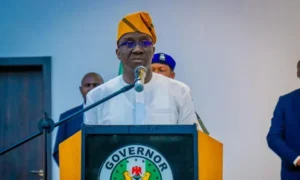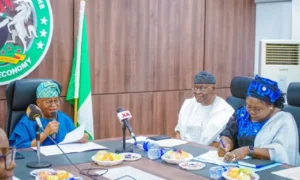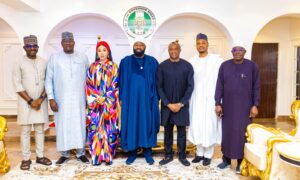Nigerian President Bola Tinubu, on Wednesday, announced the appointment of an 11-member board for the Nigerian National Petroleum Company (NNPC).
The newly appointed board of the national oil company has only one female member that made the list. She is not an independent appointee board member, but serves as an institutional representative.
Lydia Jafiya, permanent secretary and representative of the Federal Ministry of Finance, is the sole woman on the new board, as announced by presidential spokesperson Bayo Onanuga via his X handle on Wednesday.
The development has sparked concerns about gender representation in leadership roles within Nigeria’s oil sector.
Nigerian president, Mr Bola Tinubu, in a major shake-up, sacked NNPC’s Group Chief Executive Officer, Mele Kyari and board chairperson Pius Akinyelure.
Bayo Ojulari was announced as the new Group CEO and Ahmadu Musa Kida as non-executive chairperson.
“Six board members, non-executive directors, represent the coun- try’s geopolitical zones. They are Bello Rabiu, North West, Yusuf Usman, North East, and Babs Omotowa, a former managing director of the Nigerian Liquified Natural Gas (NLNG), who represents North Central,” Mr Onanuga wrote.
“President Tinubu appointed Austin Avuru as a non-executive director from the South-South, David Ige as a Non-executive director from the Southwest, and Henry Obih as a non-executive director from the Southeast.”
Others are Aminu Ahmed, a representative of the Ministry of Petroleum Resources, Adedapo Segun, the chief financial officer, and Mrs Jafiya.
Mr Onanuga said, “President Tinubu also handed out an immediate action plan to the new board: to conduct a strategic portfolio review of NNPC-operated and Joint Venture Assets to ensure alignment with value maximisation objectives.”
Mr Tinubu’s predecessor, Muhammadu Buhari, had in 2022 inaugurated an 11-member board, including two female representatives. The two women were Margery Okadigbo, the chairperson, and Lami Ahmed, who represented the North-Central region.
Despite persistent advocacy for gender balance, appointments to leadership positions in Nigeria’s oil sector, and indeed across most spheres of governance, remain overwhelmingly male-dominated.
Mr Tinubu had, in his appointment of ministers, jettisoned his campaign promise of ensuring fair women representation in his appointments.















